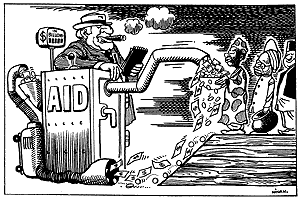 There's at least one group of people in Nepal that haven't been heard from on the country's current agony. And I for one would like them to speak up. These are the legions of development and aid people who've been assisting this country for the better part of fifty years, from America, Britain, Europe, Australia, Canada and Asia.
There's at least one group of people in Nepal that haven't been heard from on the country's current agony. And I for one would like them to speak up. These are the legions of development and aid people who've been assisting this country for the better part of fifty years, from America, Britain, Europe, Australia, Canada and Asia.They came-most of them I'm sure-with the best of intentions. They supply huge amounts of money and exercise vast influence over the country's spending and political priorities. Yet they remain faces in the crowd, not held to account by the press or public or even their own parliaments, let alone Nepal's. And they have been here all along as things spiral downwards, watching and perhaps trying to improve things-who knows? They rarely tell us.

Few other countries in the world are such proving grounds for the "development industry" as Nepal. Perhaps Bangladesh and one or two in Africa, but that's about it. Nepal has provided the perfect development destination almost since it began opening up to the outside world in 1951. Cold warrior aid was among the first tranche of money to start arriving; western countries-particularly the US-were worried about China's communists and keeping a hedge of friendly countries around the dragon of East Asia. It was perhaps the stupidest of all reasons to pour money into a place, but those were troubled times too.
The world had just emerged from a convulsive World War whose great powers were racing to develop means of exterminating each other. The "Free World" cultivated newly open Nepal and began the process of upending bags of cash from on high-a process that continues today, the difference being that the money stays largely in Kathmandu these days.
Then there were the heady sixties and early seventies when "Changing the World" was on the agenda. Largely orthodox conservative governments in western capitals in the West often weren't aware of just how radical their foreign assistance brigades were. Sandalled, dope-smoking, protesting hippies at home made dedicated aid workers in foreign lands, or at least shared political views and dissatisfaction with the majority view in their native lands. No real problem there, you had to be well outside the mainstream to abandon the easily realised material dreams of home to share burdens overseas.
The most far-reaching development change of the 1980s was the emergence of Japan as the world's-or at least Asia's-largest aid donor. In those days, Tokyo's bureaucrats and business types presided over an economy that seemed destined to dominate the world. My Japanese friends will-I hope-forgive me for observing that their country's perverse and now heavily discredited political culture allowed all sorts of corrupt and damaging development practises to flourish, even as countless crores of yen flowed forth promiscuously. It is, of course, all drying up now as the chickens of corruption and cronyism come home to roost in today's Japan.
In the nineties, development became an industry as it still is today. The Economist magazine, house organ of the business elite of the West, is where Britain's Department for International Development advertises for experts. So too, the United States Agency for International Development, SNV of Holland, Germany's GTZ, Helvetas and all the rest, professionalism was in, the old style radicalism and commitment was out. DFID and others wanted "Poverty Specialists", "Economists" and communications experts, especially the latter.
And through it all, where was poor Nepal? Riding the crest of the latest wave of course, surfing through gender workshops, good governance seminars, putting public health first, stressing basic education, the rights of child, developing capacity, institution building, encouraging local NGOs and today-signing up for conflict resolution workshops-the latest development gravy train trend that enriches consultants and creates tax-free opportunities in foreign lands.
But has any of it made a damn bit of difference over the years? You can argue yes, you can argue no. But what you can't do is blame the current state of Nepal entirely on Nepalis. For decades, donor countries and aid agencies have exercised huge, unaccountable influence over this country's polity and economics. It's time for a little mea culpa from the aid community.



